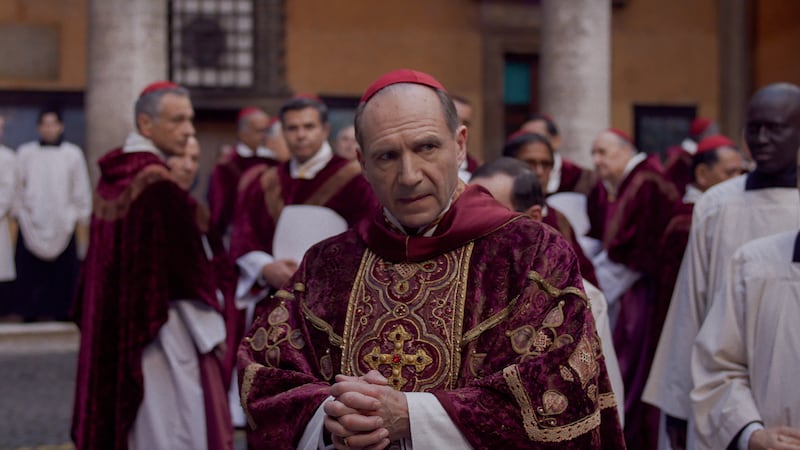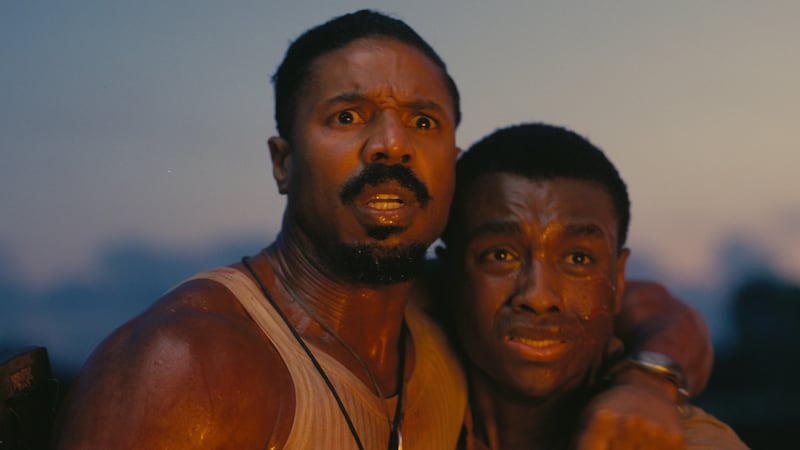‘Conclave’ presents a compelling exploration of how one’s faith intertwines with politics and organized religion
“Is this what we’re reduced to? To vote for the least worst option?” - Cardinal Lawrence in ‘Conclave’

PHOENIX (AZFamily) — A crisis of internal and external proportions.
Synopsis
Cardinal Thomas Lawrence (Ralph Fiennes) has just received some rather distressing news: the Pope is dead. With the need to elect a new one, Lawrence is assigned as the leader of the papal Conclave to do so. Four candidates lead the race, but each of them is not without their own sort of sin. As secrets about them come to light over the next few days of the conclave, Lawrence experiences a crisis of faith, unsure of who he can trust to lead the Catholic Church.
My thoughts
Conclave has one of those concepts that seems thrilling on its surface. “The Pope has been found dead,” is all you need to intrigue. Has he been murdered? Is there a conspiracy afoot? Well, as it turns out, not really. There’s nothing suspicious about his death as he was already in poor health, but who said you need somebody to be murdered for there to be some intrigue?
So, yeah, there are no grand conspiracies at play of people getting murdered to keep or cover up secrets, but there are still conspiracies and secrets abound. They’re just far more interpersonal, focusing on the character’s personal lives and interactions. As the different Cardinals vie for the papacy, their true natures are revealed, showing they’re not really all that pious in the first place.
Religion and politics
That’s exactly how many religious leaders are, which also extends to politicians and others who hold immense power. They talk a big game about how moral and just they are but are the complete opposite behind closed doors. Their values only go as far as the power they seek to claim will let them, acting like massive hypocrites once they’re found out. Absolute power corrupts absolutely, but they’re already near the finish line on both fronts.
Of course, the cardinals in Conclave would rather these facts involving love affairs, illegitimate children, and making money by selling sacred church objects be kept secret. Since the Pope is elected by a vote just like any politician, that means his election is open to manipulation just like any other. These men of power think they can use their status to keep the past buried, but Lawrence, Sister Agnes (Isabella Rossellini), and even the late Pope know where to dig up the dirt.
Lawrence is the only cardinal who doesn’t appear to have some sort of baggage, so he seems like the right choice for the Pope. He doesn’t want it, though, being emblematic of that old saying, “Only those who do not seek power are qualified to hold it.” Even then, his progressive ideals clash with the more traditionalist cardinals who want to maintain the status quo or even regress back generations. What really matters is that he remains honest to himself even when struggling with his faith.
There are millions of sound arguments to be made about not intertwining religion with politics, but Conclave shows that the way the Catholic Church and governments operate is basically one and the same. The various discussions the cardinals have about what direction the Church should go in are really no different than the discussions our representatives have in Congress. You could really superimpose some U.S. politician’s face onto these cardinals and basically get the same movie.
Divine isolation
Characters who undergo a crisis of faith have always been compelling to me, especially when they’re as devout as a Catholic clergyman. Many things can rock people’s religious foundation, but it’s the religion itself that’s rocking Lawrence’s. As time goes on and he grows older, he feels increasingly out of place in his own Church, bouncing between whether everybody else is moving in the wrong direction or wondering if he is.
Ralph Fiennes captures Lawrence’s crisis of faith with phenomenal subtlety and depth. Being the esteemed man of God he is, he slowly has to come to terms with his own beliefs that the Church has led itself astray and needs further correcting. He feels a certain sense of betrayal, though, as none of these other candidates have held themselves to the standards that they should have. It’s no wonder the Pope trusted him so much.
The whole cast is terrific really, one of those types of movies where you can’t imagine anybody else playing these roles. Stanley Tucci, John Lithgow, Lucian Msamati, Carlos Diehz, and Sergio Castellitto all perfectly embody their different cardinal characters. They all bring their own little touches to fill them out and make them distinct, such as Castellitto’s cardinal occasionally hitting his vape pen, which was hilarious. Isabella Rossellini also makes the most of her limited role as Sister Agnes, the all-seeing, all-hearing, and all-knowing nun.
Director Edward Berger and screenwriter Peter Straughan achieve a fine balance of presenting these events in a clinical, low-key manner, while still keeping the suspense and intrigue high. Volker Bertelmann’s score does a lot here to add to that feeling that what’s going on here is absolutely historical and will have far-reaching ramifications, although it does sometimes feel a bit too overbearing compared to what we’re seeing on screen.
Straughan adapted the screenplay from Robert Harris’ novel of the same name, and you can definitely feel the gravity of the papal conclave with how they get into the nitty-gritty details of how it all operates. I’ve never known of what really goes on behind the scenes when they elect a new Pope. Obviously, it’s a complicated process, but we get to see here just to how complex, secretive, and anxiety-inducing it all is. This specific narrative may be fictional, but it feels like you’re a fly on the wall during these lengthy debates.
There’s a heavy sense of isolation that looms over the proceedings, with Nick Emerson’s precise editing keeping things slightly tense. Stéphane Fontaine’s cinematography takes great advantage of the large open setting of Vatican City and its buildings. There are many eye-catching moments where the characters are surrounded by nothingness, with their vibrant vestments creating a sea of red in these massive rooms. I felt like I was walking through an art museum while taking in some of these striking shots.
Final verdict
Conclave isn’t just a gripping story about a deeply religious man struggling with his faith in an everchanging, cynical world, but it also allows a fascinating look into how the Catholic Church operates behind closed doors. It’s all handled with a deft hand by Edward Berger and Peter Straughan, presenting the events in a mature way that respects its audience.
This is also certainly the closest any of us will come to observing an actual papal conclave, so not only does this provide some solid character-based drama but it also offers legitimate historical and traditional content for people to learn about. One doesn’t need to be religious or Catholic in order to enjoy Conclave, because a great movie is sometimes just that: a great movie.
My rating: 8/10
Conclave is currently streaming on Peacock and available for rent and purchase on physical and digital platforms.
See a spelling or grammatical error in our story? Please click here to report it.
Do you have a photo or video of a breaking news story? Send it to us here with a brief description.
Copyright 2025 KTVK/KPHO. All rights reserved.






